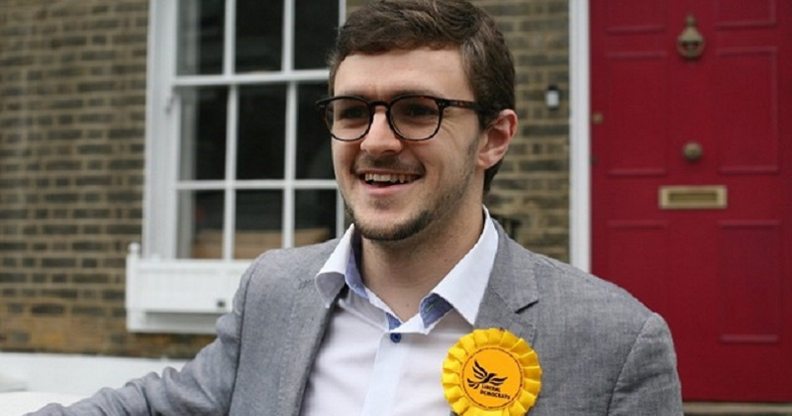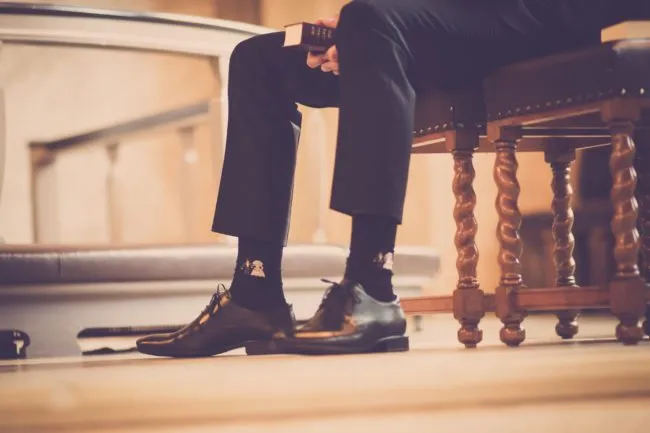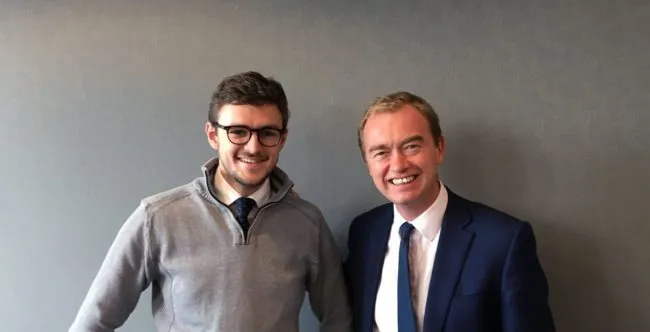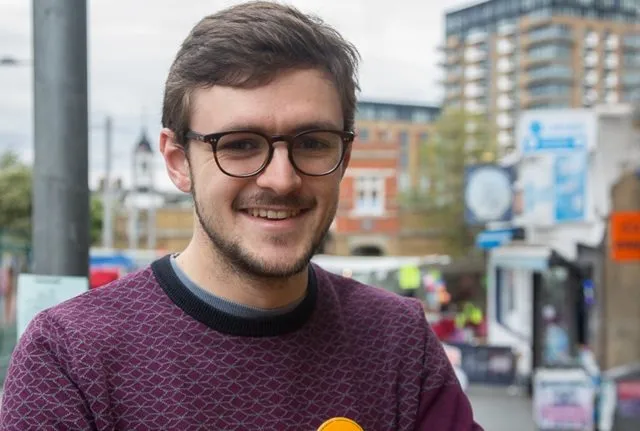I married a woman, I tried to be a ‘good Christian’ – but nothing could change my sexuality

Liberal Democrat campaigner Chris Adams writes for PinkNews about reconciling his faith and sexuality – and he has a message for people who think being gay is sinful.
This is one of the hardest things I’ve ever had to do, and I’ve been through some pretty tough shit in my life. I’m not complaining – it’s made me who I am today. And I love who I am today. I wouldn’t swap it for the world, to be honest.
Recently I saw a tweet replied to by Vicky Beeching – a Christian singer/songwriter who has in recent years also come out, and become an LGBT+ rights campaigner. The tweet talked about how a man had left his church community because of their reaction to his son coming out. One moment his son was being encouraged into leading youth work, the next he was being shunned. The only difference: he was finally being honest about who he is. It’s a scenario that is all-too-common within Christianity.
In response I wrote this: “I think those of us who have the strength to stand up and be counted for being gay and a Christian have a responsibility to do just that – but it can be tough without the support around us and example of people like you. I’m incredibly blessed to have both.”
It’s important for me to give a bit of history from the outset. Prior to coming out I had always been taught and accepted (since coming to faith at university) that although there was nothing more inherently wrong with me than with any other Christian, acting on gay sexual desire was wrong. It was partly this teaching and this mindset which led me to marry a woman in my mid-20s. I convinced myself that I was bisexual, because that was OK: I could still get married and have kids that way. I could be like anyone else. That was wrong of me, but perhaps the context explains why I was blind to the fact it would never have worked.
I came out just over two years ago. Coming out meant ending my relationship with my wife, and frankly putting her through hell because I couldn’t hide any longer. It’s a series of events I will always feel immensely guilty about. She didn’t deserve what I put her through. The fact is though I was verging on the suicidal. It wasn’t a choice I made, it was a necessity. And as a Christian I remember time and again turning to God and throwing myself onto him – asking him to bring good out of an impossible situation.

My decision to leave was not taken very well by my church. My pastor rang me and said I couldn’t be a Christian if I was doing this. Friends who had previously said I could crash on their sofa any time of day or night suddenly said they had no time for me. I’m just incredibly grateful for the small group of friends (some Christians but unrelated to my church) who rallied round me to support me. I know that having been rejected by my church, I couldn’t have survived this without them.
It is impossible to overestimate the extent of turmoil I went through in those months. It was an identity crisis. I felt as though I had two incompatible identities: neither of which I could deny or give up. I think for some this can be very difficult to understand, but for me my faith is an integral part of my identity: as deeply personal and unchangeable in nature as my sexuality.
There began a journey to try and reconcile my faith and my sexuality. I encountered Vicky Beeching – she taught by her example me that being gay and a faithful Christian weren’t incompatible. I had long conversations with Vernon White at Westminster Abbey, the wonderfully humble Canon Theologian. After a few months I knew that it was possible, intellectually, to reconcile my faith and my sexuality. I could faithfully interpret the Bible in such a way that it didn’t have to mean gay sex was a sin. In fact, it makes more sense to force women to wear hats in church (see 1 Corinthians 11) than it does to say that homosexual acts are sinful. Needless to say: I don’t think women should be forced to wear hats in church.

The trouble was that, although in my head I now knew I could be both a faithful Christian (perhaps even an evangelical) and true to myself as openly gay, I still felt as though something was wrong. It took me a while to realise it, but the truth is I was judging myself. I still told myself that there was something inherently wrong with me being gay. I hadn’t realised until then, but I had always thought that. The truth is, it isn’t possible to believe, as a gay Christian, that there’s something wrong about expressing my sexuality without also believing there is something inherently wrong (sinful) with me. I couldn’t believe gay sex was a sin, and not believe homosexuality as a state was also a sin. Frankly anyone who thinks that is kidding themselves. Or perhaps I should say they are ‘deceiving themselves and the truth is not in them’.
Now I know my Bible. And I know my God. I know that God is defined by the perfect love described in 1 Corinthians 13. I know God loves me just as I am. God loves me for who I am. He accepts me and cherishes me. I have known that for each of the last 13 years. Nothing and no-one is going to separate me from the love of God.
The truth is, though, that over last two years, sometimes I have doubted God’s love because of what some Christians have said. Because of what some Christians taught me when I was younger. Because of the way some Christians react when I openly declare ‘I’m gay’ – rushing to a judgment in their own minds as to what that means and instinctively wanting me to be different, to be the same as them: heterosexual. ‘Normal’, or as they would see it ‘the way God wanted me to be’.
Let’s be honest here and have the intellectual integrity of taking that belief to its logical conclusion. As a Christian if you believe either gay sex or homosexuality is a sin, you believe there is something inherently wrong with my created being. You believe that I am not created in the image of God. You believe that, quite apart from the generic doctrine of original sin (basically the statement that none of us are perfect), there is something else specifically wrong about me which isn’t wrong in other people. I am defective in some way. A freakish by-product of a fallen world – more so than anyone else. A lot of evangelical Christians like to avoid this kind of analysis by just keeping it superficial and not thinking this doctrine through.

Chris with former Lib Dem leader Tim Farron
So let me be honest with my fellow Christians, and all those who would dare to judge me for who I am: God is my judge, not you. You have no right. Take the friggin’ log out of your own eye before you start pointing at the speck in mine. Read your Bible and actually try to live by it instead of judging me and making moral declarations about issues that frankly have nothing to do with you. And if you decide to start making those pronouncements, have the guts to say what you really believe: that you believe gay people to be defective and inherently sinful because of the way they are. At least then we can call it the hate crime that it is.
If you’re not going to have the intellectual honesty to do that, then why don’t you try the softer approach: try and understand why it is that I, like so many other gay Christians like me, feel rejected by the Church. Why it is that we feel cut off from the family of believers. Why we don’t feel accepted or loved. Why we get so upset when you say things which you think are just doctrinal arguments. Before you pronounce judgment on me, why don’t you try and love me? Why don’t you try and follow God’s example and actually accept me for who I am.
You see – I can’t change who I am. I have had trouble enough accepting who I am in recent years, and I have found that it is Christians, who should be defined by the love which God has for me, who are the greatest barrier time and again to me accepting myself. That’s what is sinful and wrong.

As things stand I don’t want to go to church. I desperately want to worship God openly with other Christians, and be unashamed of who I am. The trouble is, if I go to church, some stupid Christian could come up and sully that wonderful and pure experience by asking me whether I can just stop acting on my ‘gay impulses’, because clearly, they’re ‘against God’s will’. What happens if I want to take my future partner to church with me, and worship God alongside him: unashamedly holding hands as we pour out our hearts to God in worship. What if I want to do that? I shouldn’t have to feel hesitant. I shouldn’t have to fear that someone in the congregation will see and ‘lovingly’ try and point out that I probably shouldn’t be giving in to ‘temptation’ in that way. Surely of all the people in the world, Christians should be the ones to love and accept me no matter who I am! That’s the heart of the gospel, isn’t it?
So here is my open invitation to any Christian who would like to understand what it’s like to be gay and a Christian: come and talk to me. Come and meet me where I am, so you can understand why it hurts time and again – every time someone makes a public pronouncement which condemns me and those like me, just because of who we are. Help me to reach a day where I no longer have to pray ‘Father, forgive them, for they know not what they do.’
Chris Adams is the Liberal Democrat Prospective Parliamentary Candidate for Greenwich and Woolwich. He tweets @cs_adams

